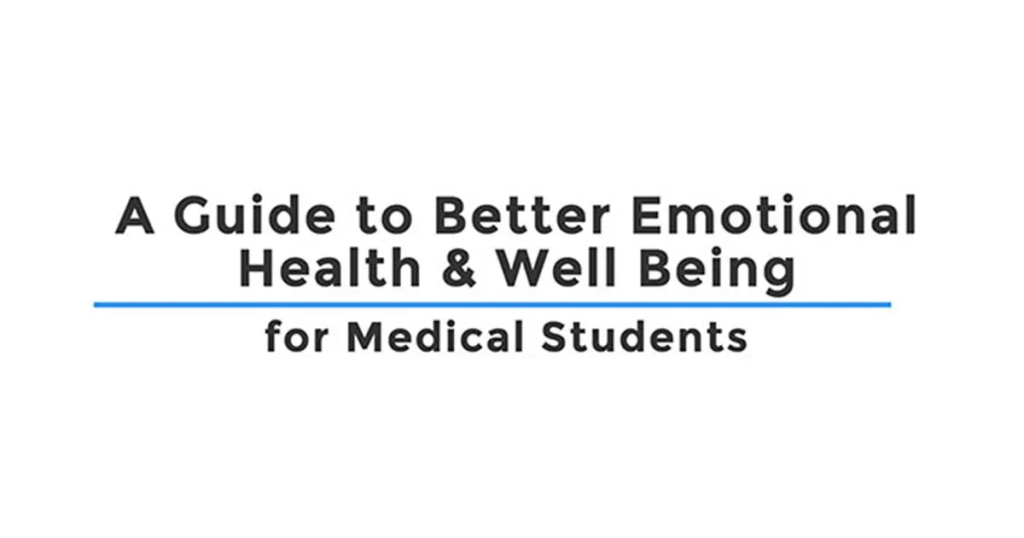Our Guide to Better Emotional Health and Well Being as a Medical Student (and how to put these tips into practice!)
SOMEHOW, YOU HAVE FOUND THE BRAVERY AND STRENGTH within yourself to pursue medical school. Congrats, there aren’t a lot of you, and we know that it’s extremely challenging. In fact, it’s so challenging that often medical students experience poor mental and physical health during their years of study. This is a no-no in our books and can be prevented. If you are a medical student looking to improve your emotional health and general well being, you’re already on your way! Check out our tips below and start implementing them into your daily life for a healthier, happier you.
 #1 drink enough water
#1 drink enough water
You’ve heard this countless times, and we get that you’re probably sick of hearing it. Drink water this, drink water that… you’re probably rolling your eyes. Drinking enough water is so important for medical students because it’s necessary for optimal brain function. It aids in your mental performance, prevents illness and headaches and simply makes you less irritable and cranky (you don’t want to be the anti-social study group drop out).
Putting it into practice: Carry a water bottle wherever you go, and drink it until you urinate frequently and with light color.
#2 set short-term and smaller goals every day
You may have heard of the importance of setting long-term goals as a medical student. One of your long-term goals is probably just to simply pass an exam or graduate on time. Setting small, reachable daily goals is just as crucial.
Putting it into practice: Make it a goal to do the simple things, such as taking a short walk outside, finishing an assignment or joining a new study group at the library. Achieve these short-term goals and feel proud of yourself and accomplishments (as you should!).
#3 take time for you
You are NOT the Energizer Bunny. You are not a student robot. You are a human being, and all human beings require “me time”. As a medical student, this could feel foreign, but you simply have to make time for yourself.
Putting it into practice: Find a hobby or enjoyable activity, like biking, painting, blogging, playing an instrument, knitting or cooking which you can resort to at least a couple times a week to keep yourself feeling sane!
#4 also take time for friends and family
Just like making time for you, making time for friends and family is just as important. Social health is necessary for assertiveness, self-awareness, learning to treat others with respect, good communication skills, a supportive network, conflict management and much more (like having fun!). So get out and be social this week!
Putting it into practice: Join a club or team, volunteer at the local hospital, join study groups or go Greek!
#5 perform “body checks”
Have you ever been studying or sitting in class and found yourself slouching over like a sloth. You immediately become aware of this and fix your shoulders and posture, immediately feeling better. Turn this into an intentional habit.
Putting it into practice: Check your breathing, posture and be sure you aren’t clenching your jaw or fists. Live more relaxed and understand your body during long study sessions and during class.
#6 stay organized and clean
Keep your papers, books and computer organized. Being organized will provide more space, save time, provides balance, will aid in achieving goals and will make a good impression on students, professors and potential employers. Also, keep your living space clean and in check! It will leave you much less stressed.
Putting it into practice: Have a budget, use a planner, color code, make a study schedule and avoid procrastination.
#7 find quiet time
As a medical student, you’re probably not used to much quiet time, unless it means a textbook in your face or a date with the library all night. It’s essential, however, to find alone time where it’s quiet when you feel overwhelmed or stressed.
Putting it into practice: Take a long shower, go for a walk in a park, visit the school art museum, or just sip your morning coffee without school work in your hand to help you re-start, find stability, peace and joy.
#8 catch some zzz’s
College students, especially medical students, are considered the most sleep-deprived populations (according to campusmindworks.org). Don’t be one of the 73 percent of students who report sleeping issues.
Not sleeping is proven to negatively impact a student’s GPA, because a lack of sleep hinders a student’s ability to memorize and concentrate. In addition to optimal brain functionality, enough sleep is necessary for a better mood, good judgment, reaction time and the ability to learn.
Putting it into practice: Stop using all technology at least half an hour before bedtime, avoid caffeine after 3 pm and don’t sleep in more than an hour on the weekends compared to the weekdays.
#9 network with other medical students
As a medical student, you probably have felt isolated at some point during your college career. Networking is absolutely necessary during medical school for many reasons, it helps you land a job when you graduate, gives you real-life insight into your desired career and provides incomparable resources when you may need help.
Networking with other students, can help you feel more connected, less alone and can be less intimidating than attempting to network with employers, alumni, etc.
Putting it into practice: Find online forums and chats (like Student Doctor Network), use LinkedIn and remain in contact with other students in the same field as you.
#10 utilize all the resources you can
What is your daily medical student college routine like? Do you wake up, go to class, study then sleep? If you aren’t using all resources you can during medical school, chances are you are missing out. Utilizing all resources during your college years will help you stay stress-free and mentally sharp.
Putting it into practice: Hit the bookstore, library, gym, career center, your academic advisor, join medical student clubs and go to program-specific job fairs at any given opportunity.
Check out our online ACLS practice exams here (BLS and PALS also available)
The pressures of medical school are going to impact your mental and physical health in some way or another. Deal with the stress and take control of your health by utilizing these tips.
We couldn’t list them all, so comment below other tips you have for medical students! Check out our infographic below!


